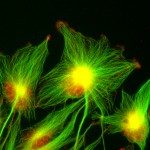Link to Pubmed [PMID] – 34663953
Link to DOI – 10.1038/s41563-021-01108-x
Nat Mater 2022 03; 21(3): 366-377
Mechanotransduction is a process by which cells sense the mechanical properties of their surrounding environment and adapt accordingly to perform cellular functions such as adhesion, migration and differentiation. Integrin-mediated focal adhesions are major sites of mechanotransduction and their connection with the actomyosin network is crucial for mechanosensing as well as for the generation and transmission of forces onto the substrate. Despite having emerged as major regulators of cell adhesion and migration, the contribution of microtubules to mechanotransduction still remains elusive. Here, we show that talin- and actomyosin-dependent mechanosensing of substrate rigidity controls microtubule acetylation (a tubulin post-translational modification) by promoting the recruitment of α-tubulin acetyltransferase 1 (αTAT1) to focal adhesions. Microtubule acetylation tunes the mechanosensitivity of focal adhesions and Yes-associated protein (YAP) translocation. Microtubule acetylation, in turn, promotes the release of the guanine nucleotide exchange factor GEF-H1 from microtubules to activate RhoA, actomyosin contractility and traction forces. Our results reveal a fundamental crosstalk between microtubules and actin in mechanotransduction that contributes to mechanosensitive cell adhesion and migration.



